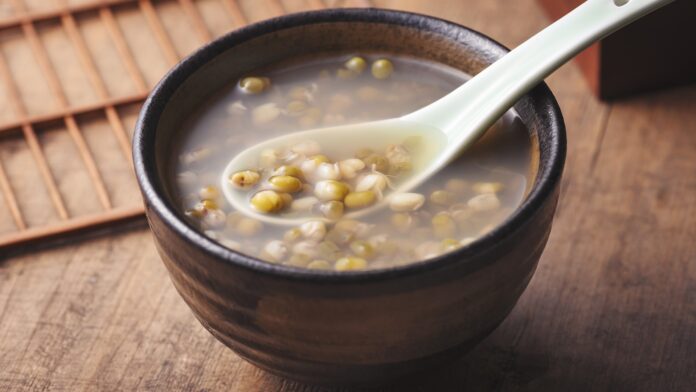In the scorching summer, it’s no surprise that many people enjoy cold drinks and ice cream. Chilled green bean soup is a particular favorite for some, but recently, a man in his early 40s from Zhejiang had a stroke after consuming it before bedtime.
Engaged in sales work, Zheng, the man in question, tirelessly pursued his sales targets even in the hot weather. A few days ago, he took out a bowl of chilled green bean soup from the fridge that he had prepared in the morning. However, after drinking a bowl of it, he started experiencing diarrhea and felt weak to the point of almost fainting. Exhausted and feeble, he fell asleep in an air-conditioned room.
The next day, upon waking up, Zheng felt weakness in his limbs and difficulty walking. He gradually noticed that he couldn’t lift his arms and legs properly, his speech was slurred, and the left side of his body became particularly stiff. Concerned family members rushed him to the hospital, where a head CT scan and blood tests revealed that he had suffered a cerebral infarction, commonly known as a stroke. The stroke was attributed to his consumption of chilled green bean soup before sleeping.
Dr. Shao Yanqi, a neurologist at Zhejiang People’s Hospital, explained that in most cases, if treatment can be administered within 4.5 hours of the stroke’s onset, intravenous thrombolysis is the most effective method for acute ischemic stroke. However, since Zheng’s stroke occurred during sleep, the exact onset time couldn’t be determined.
To evaluate the situation further, Zheng underwent a magnetic resonance imaging (MRI) scan. By comparing different signal sequences, the doctors found that the ischemic brain tissue had not fully necrotized, providing a window for thrombolysis. After obtaining the patient’s consent, the medical team promptly administered thrombolysis, and Zheng’s condition gradually improved during subsequent treatment.
But why did a bowl of chilled green bean soup lead to a stroke? Dr. Zhang Sheng, the deputy head of the Neurology Department, pointed out that in most cases, strokes result from a combination of internal and external factors.
Dr. Zhang’s analysis suggested that during the day, Zheng sweated heavily due to his work, leading to dehydration and increased blood viscosity due to severe diarrhea. Additionally, consuming the chilled green bean soup and sleeping in an air-conditioned room caused his blood vessels to constrict. Adding to the risk, Zheng had a history of high blood pressure and had been a smoker for decades, which eventually compounded to cause the stroke.
Indeed, the role of chilled green bean soup as a critical factor in the stroke is apparent. It caused diarrhea, which exacerbated blood thickening, and its cold temperature contributed to the constriction of blood vessels.
It’s worth noting that even without a history of chronic diseases or consuming chilled green bean soup, significant sweating followed by exposure to cold air or cold water can also trigger a stroke. For instance, a man in his 50s, Mr. Wang, had gone for a run outdoors and returned home drenched in sweat. He turned on the air conditioning and took a cold shower before resting on the sofa, but upon waking up, he experienced stiffness on one side of his body. After being hospitalized, he was diagnosed with a stroke.
Dr. Zhang explained that Mr. Wang had no history of hypertension or diabetes, but the stroke was associated with excessive sweating after exercise, inadequate hydration, and exposure to cold air and cold water. Sweating excessively leads to significant dehydration, reducing blood volume and thickening the blood, making it prone to clot formation. Combined with Mr. Wang’s smoking habit and high blood lipid levels, which caused mild narrowing of blood vessels, multiple risk factors led to a blockage in the intracranial blood vessels, resulting in ischemic necrosis of brain cells.
Dr. Zhang urged the public to ensure adequate hydration during the sweaty summer months, avoid increased blood viscosity, and take measures to prevent cooling off too quickly, especially during sleep. Prolonged exposure to a cold environment, such as directing a fan or air conditioner airflow towards the head, or encountering significant temperature differences between indoor and outdoor environments, can induce cerebrovascular diseases, especially in patients with pre-existing cerebrovascular conditions.
